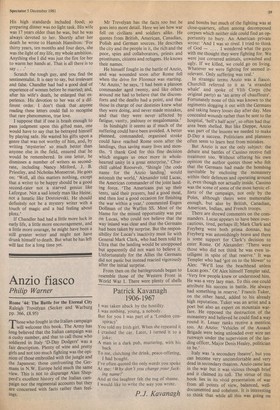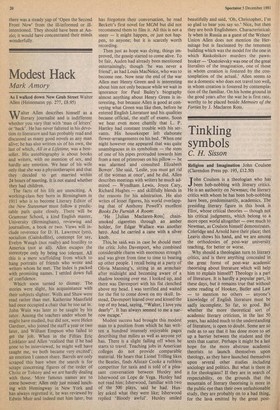Patrick Kavanagh 1906-1967
I was taken aback by the hostility.
was nothing, young, a nobody.
But for you I was part of a 'London conspiracy' You told my Irish girl. When she repeated it I crashed the car. Later, I turned it to a joke: A man in a dark pub, muttering, with his back To me, clutching the drink, peace-offering, I had bought.
I've often quoted the only words you spoke At me: 'Why don't you change your fucking name!'
And at the laughter felt the tug of shame. I would like to write the way you wrote. and bombs but much of the fighting was at close-quarters, often among decomposed corpses which neither side could find an opportunity to bury. An American private wrote: 'And I was so tired. I tried to think of God — I wondered what the guys with me thought they were fighting for. We were just cornered animals, unwashed and ugly. If we killed, we could go on living. Whatever we were fighting for seemed irrelevant. Only suffering was real.'
In strategic terms Anzio was a fiasco. Churchill referred to it as 'a stranded whale' and spoke of Vlth Corps (the original party) as 'an army of chauffeurs'. Fortunately none of this was known to the regiments slogging it out with the Germans and taking heavy losses day after day. Men concealed wounds rather than be sent to the hospital, 'hell's half acre', so often had that area been shelled. But like Dieppe, Anzio was part of the lessons we needed to make D-Day a success. Politicians and planners often seem to learn best from mistakes.
But Anzio is not the only subject: the debate and battles of Cassino receive full treatment too. Without offering his own opinion the author quotes those who felt that the Germans had made the bombing inevitable by enclosing the monastery within their defences and operating around it, even though not actually inside. Cassino was the scene of some of the most heroic efforts of the campaign, not only by the Poles, although theirs were memorable enough, but also by British, Canadian, American, Indian, and French troops.
There are shrewd comments on the commanders. Lucas appears to have been overcautious, tired, perhaps ill; Mark Clark and Freyberg were both prima donnas, but Freyberg was astonishingly brave and there is some support for Clark's decision to enter Rome. Of Alexander: 'There were those who did not think he was even intelligent in spite of that reserve.' It was Templer who had 'got on to the blower' to Alex: 'We'll lose the beachhead unless Lucas goes.' Of Alex himself Templer said, 'Very few people knew or understood him. He was a very lazy man. To this one could attribute his success in battle. He always had something in reserve.' Francis Tuker, on the other hand, added to his already high reputation. Tuker was an artist and a poet but also an expert on mountain warfare. He opposed the destruction of the monastery and believed he could find a way round it. Lesser ranks receive a mention too. At Anzio: 'Vehicles of the Assault Brigade were being unloaded over wire net runways under the supervision of the landing officer, Major Denis Healey, politician to be.'
Italy was 'a secondary theatre', but you can become very uncomfortable and very dead in secondary theatres. Anzio came late in the war but it was vicious though brief and it claimed its toll. The virtue of this book lies in its vivid presentation of war from all points of view, balanced, welldocumented and coherent. It is interesting to think that while all this was going on there was a steady yap of 'Open the Second Front Now' from the ill-informed or illintentioned. They should have been at Anzio; it would have concentrated their minds wonderfully.











































 Previous page
Previous page